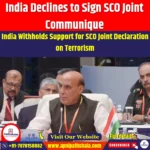India Declines to Sign SCO Joint Communique
General Studies Paper II: Regional Groupings, Important International Institutions |
Why in News?
Recently, India declined to approve the joint communique at the SCO Defence Ministers’ meeting in Qingdao. India said the statement failed to address the Pahalgam terror attack and unfairly highlighted Balochistan.
Key Highlights of India Declines to Sign SCO Joint Communique
- Venue:
- China hosted the SCO Defence Ministers’ Meeting in Qingdao on June 25–26, 2025.
- The meeting was held in Qingdao International Conference Centre, the same venue where leaders met during the 2018 summit.
- Participants:
- Ministers from all 10 member nations—China, India, Pakistan, Russia, Iran, Kazakhstan, Kyrgyzstan, Tajikistan, Uzbekistan, and Belarus—were present.
- Focus Areas:
- The meeting placed strong emphasis on regional security and anti-terror cooperation.
- The ministers reaffirmed commitment to the “Shanghai Spirit” and pledged to deepen defence collaboration.
- Delegates discussed new security threats, including hybrid warfare and proliferation of weapons of mass destruction.
- India called for unified action on terror, drone threats, and radicalization.
Why India Declined to Approve the Joint Communiqué?
- India found the draft communique weak on counter-terrorism. It did not condemn the April 22 Pahalgam terror attack.
- During the event, India strongly criticized the final communique, accusing it of showing bias and inconsistency.
- India insisted on direct naming of Pakistan-linked terror groups. India noted that the Resistance Front, a Lashkar-e-Taiba offshoot, claimed responsibility for Pahalgam.
- India reaffirmed India’s zero-tolerance stance on terrorism. India mentioned “Operation Sindoor,” May 7, 2025 counter-terror operation against cross-border training camps.
- Allegations emerged claiming India supported unrest in Balochistan, a charge included in the communique that India firmly denied.
- It was the first time that no common defence statement came out of an SCO defence meeting.
What is Shanghai Cooperation Organisation (SCO)?
- Introduction:
- The Shanghai Cooperation Organisation (SCO) has grown into a significant regional platform that shared goals in security and cooperation.
- It brings together countries from Asia and Eurasia with a shared goal of cooperation in security, economy, and politics.
- The group has expanded its role in global diplomacy and regional stability since its formation.
- SCO covers around 60% of Eurasia, houses nearly 40% of the world’s population, and contributes over 30% of global GDP.
- Foundation:
- The foundation of the SCO dates back to 2001. It was formed in Shanghai, China, by six countries:
- China
- Russia
- Kazakhstan
- Kyrgyzstan
- Tajikistan
- Uzbekistan
- The origins of the SCO go back to 1996.
- At that time, five countries—China, Kazakhstan, Kyrgyzstan, Russia, and Tajikistan—came together to solve border and security issues.
- These nations formed a group called the “Shanghai Five.”
- The foundation of the SCO dates back to 2001. It was formed in Shanghai, China, by six countries:
- Expansion:
- India and Pakistan joined as full members in 2017, showing the group’s growing importance.
- When Iran joined the SCO as a full member in 2023, the group expanded its geopolitical footprint into the West Asian region.
- The SCO continues to involve observer nations like Afghanistan, Belarus, and Mongolia, giving them a voice in discussions.
- Several nations including Turkey, Azerbaijan, and Southeast Asian countries engage with the SCO as dialogue partners.
- Key Goals:
- The SCO was formed to promote peace and security across member countries.
- The SCO gives top priority to joint efforts against terrorism, separatist activities, and extremist threats.
- Member nations of the SCO often take part in combined military drills and coordinated intelligence exchanges to strengthen regional peace.
- The organisation also encourages economic collaboration, energy development, cultural exchange, and transport connectivity.
- The group works to balance global power and give regional countries more voice in global matters.
Structure and Functioning of SCO
- Council of Heads of State:
- At the leadership level, the Council of Heads of State acts as the top decision-making authority.
- This council brings together the presidents or top leaders of all member countries.
- It meets once a year to discuss major political decisions and approve the organisation’s long-term direction.
- The council also finalises the annual priorities and selects the chair country for the following year.
- The chairmanship rotates among member states.
- Council of Heads of Government:
- The Council of Heads of Government deals with practical matters like the budget and economic planning.
- Prime ministers or similar officials represent their countries in this forum.
- This council also meets once every year.
- Its main purpose is to promote cooperation in trade, science, technology, and development.
- It reviews the performance of ongoing projects and explores new ways to increase regional trade.
- Council of Foreign Ministers:
- The Council of Foreign Ministers plays a key role in managing the political coordination among member states.
- It ensures that the summit decisions are implemented properly.
- This council meets more frequently and handles urgent issues such as border tensions or diplomatic challenges.
- Permanent Secretariat:
- The SCO Secretariat, based in Beijing, acts as the organisation’s permanent administrative body.
- It supports all meetings, prepares reports, and maintains official communication among member states.
- The SCO Secretariat, managed by a Secretary-General who serves a three-year term, handles everyday administration.
- Regional Anti-Terrorist Structure (RATS):
- Security is a top priority for the SCO, and the Regional Anti-Terrorist Structure (RATS) helps achieve this goal.
- The Regional Anti-Terrorist Structure (RATS), based in Tashkent since 2004, plays a vital role in coordinating efforts to combat terrorism and extremism.
- Member countries share intelligence and conduct joint exercises through this body.
- Decision-Making Process:
- All decisions must be agreed upon by every member.
- No country has veto power, and this system ensures fairness.
- The process respects the sovereignty of each nation and builds mutual respect.
- This approach has helped the SCO stay united despite the different political systems and interests of its members.
Strategic Importance of SCO for India
- India’s SCO Journey:
- India joined the SCO as an observer state in 2005, aiming to build ties with the Central Asian nations.
- It took over a decade of consistent participation before India became a full member in 2017, along with Pakistan.
- India hosted the SCO Summit in 2023, where it highlighted the need for inclusive growth, regional respect, and equal sovereignty.
- Promoting Regional Security:
- The group allows India to work with neighbours and Central Asian states to counter extremist threats.
- India supports the activities of the Regional Anti-Terrorist Structure (RATS) and has participated in joint military drills like Peace Mission 2021, hosted in Russia.
- These exercises help improve coordination and share strategies to tackle cross-border threats.
- Building Transport and Trade:
- SCO provides a platform where India discusses projects like the International North-South Transport Corridor (INSTC) and Chabahar Port in Iran.
- These routes aim to reduce dependency on traditional sea lanes and establish faster links to Eurasian markets.
- India also promotes the India-Central Asia Air Corridor and supports cross-border digital networks.
- India promotes small and medium enterprise (SME) cooperation and startup collaboration through SCO’s economic forums.
- Natural Resource Access:
- SCO gives India a direct channel to engage energy-rich countries like Kazakhstan, Turkmenistan, and Russia.
- India aims to build reliable energy partnerships and explore pipeline routes that secure long-term access to vital fuel resources.
- Through SCO discussions, India has expressed interest in projects like the TAPI (Turkmenistan-Afghanistan-Pakistan-India) pipeline.
- Balancing China’s Influence:
- India uses the platform to counter China’s Belt and Road Initiative (BRI) and to raise its voice on sovereignty and fairness.
- For instance, India has refused to support BRI at SCO summits, citing concerns over sovereignty and transparency, especially related to the China-Pakistan Economic Corridor (CPEC).









